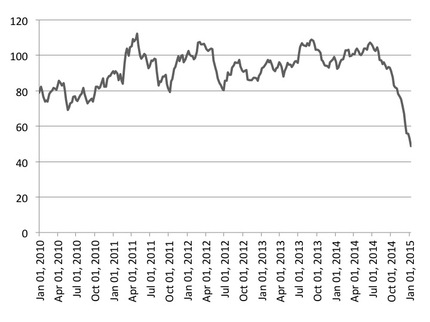
What does the oil price drop mean for the…
Oil is in the midst of an unprecedented price fall having lost more than 50% of its value since July of last year. This price collapse has massive global economic implications, not least on the power sector. It is clear that oil producers, including both countries and companies, are under tremendous financial strain given many projects and budgets were based on assumed prices of 80-100 USD per barrel. The economic impacts have also spread to suppliers of the oil industry, including equipment suppliers as well as bank and loan providers. Of course energy consumers, both companies and individuals, are also impacted, generally experiencing price cuts in their energy bills and seeing large drops in the gasoline and diesel prices.

The picture is less clear for power providers and especially for renewable and alternative energy providers. As for microgrids, since most microgrids (and particularly non-interconnected autonomous microgrids) are heavily dependent or primarily based on diesel generation, the cost of producing each kWh of energy has fallen which can benefit operators and consumers if the price reductions are passed on. As diesel fuel is typically the most significant cost factor for diesel based microgrids, the impact can be significant. In remote locations where transport costs are also an important factor, the oil price reduction can also have secondary impacts through lower transport costs and as the fuel may be less attractive for theft.
For renewable energy generators and renewable-focused microgrid projects which are an alternative to diesel based generation, the lower oil price will impact the cost differential between renewable and diesel generation. This means that new renewable focused projects may be cancelled, delayed, or the level of renewable generation reduced as the economics for renewables becomes comparatively worse. However, as the oil price drop has been very sudden and as there is still much speculation on if and when the price will rebound and at what level the price will stabilize at in the medium term, the most-likely outcome is that project decisions and technology selections will be delayed in the current environment.
For operating renewable power providers and renewable focused microgrids, the reduction likely has limited impact on the level of renewables as the marginal cost of generating renewable power is almost nil. This means that renewable energy will still take precedence over diesel even at very low diesel prices. As diesel is typically still used as part of the power supply mix in many cases, the lower oil prices will benefit these microgrids for the portion of power that comes from diesel.
The news for renewable microgrids is not all bad though because the oil price drop is having some important policy effects – namely the elimination or reduction of fuel and diesel subsidies in many emerging markets. Many emerging markets have been subsidizing fossil fuels resulting in the local market price for diesel being disconnected from global prices and the oil price. Not only has this been extremely costly for emerging economies, but this has resulted in diesel generation being heavily favoured and making it almost impossible for renewable generation to compete. Several important markets, including Indonesia (in December 2014) and India are taking advantage of the drop in oil prices to cushion a transition away from these subsidies. Indeed Christine Lagarde of the IMF states that:
The drop in oil prices provides a golden opportunity to cut energy subsidies and use the savings for more targeted transfers to protect the poor – for which the IMF has been pushing hard. We have recently seen a successful decrease in fossil fuel subsidies in countries such as Cameroon, Côte d’Ivoire, Egypt, Haiti, India, Indonesia, and Malaysia. In some advanced countries, policymakers should also seize the moment to increase energy taxes to build fiscal buffers or reduce other taxes, especially on labor.
This means that renewable generation and renewable microgrids will be able to more fairly compete with diesel generation and will greatly benefit when oil prices stop dropping and stabilize or begin to increase. In the medium to long term the current drop in oil price will be tremendously beneficial for renewable microgrids even if there is some short term pain.